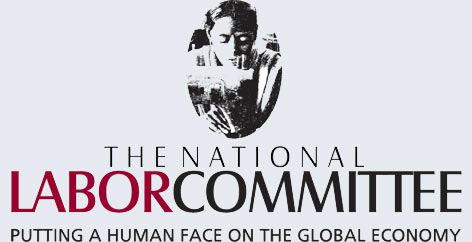
National Labor Committee Challenges G-20 Leaders to Intervene
CONTACT: Barbara Briggs 412-562-2406 - bbriggs@nlcnet.org
PITTSBURGH –Children are among the 30,000 workers who labor under perilous and grueling conditions in Bangladesh to break apart ships that once carried the freight of the world’s G-20 nations, according to a report issued today by the National Labor Committee.
The new report, “Where Ships and Workers Go to Die: Ship-breaking in Bangladesh and the Failure of Global Institutions to Protect Worker Rights,” documents the plight of workers who dismantle ships of the G-20, working 12-hour shifts, seven days a week, under primitive conditions for wages of just 22 to 32 cents an hour—doing one of the most dangerous jobs in the world.
Charles Kernaghan, director of the National Labor Committee, challenged the G-20 ministers to take up the issue: “The G-20 leaders must be held accountable for having miserably failed workers across the developing world, workers who continue to be injured, cheated, maimed, paralyzed and killed on a daily basis.
A worker told Kernaghan, “We are fighting with death always. This is not work. This is a place of punishment and death.”
On average, each day, one worker is injured, and every three weeks, one is killed. On Sept. 5, 2009, two workers were burned to death when sparks from a blowtorch ignited a gas tank, which exploded and engulfed them in flames. (See UPDATE on shipyard fire) Three other workers were severely burned. On July 14, 2008, a 13-year-old child was killed on his first day of work, when a large iron plate fell from a ship, striking him on the head.
Workers are exposed to numerous toxins without any protection. Each ship contains an average of 15,000 pounds of asbestos and 10 to 100 tons of lead paint. Workers also come in contact with mercury, arsenic, dioxins, PCBs and carcinogenic fumes. Helpers, often children who go barefoot or wear flip-flops, use hammers to break apart the asbestos inside the ships, which they carry out and dump on the sand.
The ship-breaking workers lack even the most rudimentary protective gear. Cutters, who use blowtorches to sever ship hulls, wear sunglasses rather than protective goggles. They wrap dirty bandanas around their noses and mouths since they are not given respiratory masks. And they wear two sets of shirts for lack of welding vests and hope that the sparks will not burn through to their skin. Still, it happens every day.
The workers live in misery, with six sharing a small room, often sleeping directly on the dirty concrete floor. No one has a mattress.
“The workers are very clear on two points,” Kernaghan said, “that they will die early, and that there have been no improvements whatsoever over the last 30 years with respect to worker rights or health and safety. It does not have to be this way! Every child worker could be sent to school for $750 a year—including a living stipend to replace their wages. For less than $350 a year, every worker could be provided safety gear—which would save lives. The G-20 nations, which dominate world shipping, must guarantee respect for the legal rights of workers and must remove all toxic materials from their ships before they are sent to Bangladesh for scrapping.”
ATTN: ASSIGNMENT DESK/EDITORS
• 50 minutes of B-roll available, including unprecedented cell phone video shot secretly inside the ships by the workers themselves
• Still photos of ship-breakers at work
• On Wednesday morning, September 23, beginning at 9:00 a.m. Charles Kernaghan will join USW President Leo Gerard, AFL-CIO President Rich Trumka and Lori Wallach of Global Trade Watch at a teach-in at USW international headquarters, 60 Boulevard of the Allies
• Kernaghan will be available to discuss the report and the responsibility of G-20 nations to ensure that workers around the world are protected and child labor abolished after noon on Wednesday. Contact Barbara Briggs at (412) 562-2406 or bbriggs@nlcnet.org for more information or to schedule an interview.
• Report now available online at: http://www.nlcnet.org/article.php?id=672
• See UPDATE on shipyard fire at: http://www.nlcnet.org/admin/media/document/bangladesh/Shipbreaking_2009/WhereShipsAndWorkersGoToDieUPDATE.pdf
New Report Available at: http://www.nlcnet.org/article.php?id=672
- 30 -
